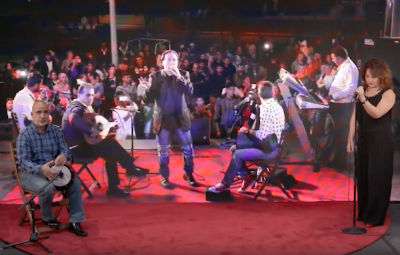
Musicians without borders at Mastercard event: Greece and Olin.
Musicians connected across hemispheres, from a stage in Greece to Frick Forum at Olin Business School. Students examined the first purchases ever made by refugees in Lesbos—thanks to Mastercard technology.
These scenes and others were part of a heartstring-tugging, space-bending event hosted Oct. 12 throughout Olin’s atrium. During the event, the technology company used its worldwide support of refugee services to demonstrate the power of its technology—and encourage students to give the company a look as they complete their business school education.
Mastercard memorialized the event and WashU’s place in it with a three-minute video that outlined the program and its connection with students, technology, and refugees halfway around the world.
“How can Mastercard compete with tech companies like Google for top tech and engineering students?” the narrator says at the video’s opening. “We decided to play by our own rules and set out to make students not just see, but feel the impact they could make at Mastercard.”
The event opened with a four-minute film about the refugee crisis in Lesbos and how prepaid card technology helped provide resources to refugees. Students could stroll the Olin atrium and view an exhibition entitled “My First Purchase,” showing some of the purchases refugees there had made with the help of Mastercard technology.
Later in the event, students watched a concert live-streamed from Greece, overlaid with performers in Frick Forum accompanying the musicians across the sea.
“I felt like I was almost in Greece on the other side,” said one student.
The event closed with a panel discussion featuring Nina Nieuwoudt, Mastercard’s vice president, product management; Michael Fracarro, Mastercard’s chief human resources officer; Kelly Joscelyne, Mastercard’s chief talent officer (and the program moderator); Todd Milbourn, Olin’s vice dean; and Edgar Aguilar, Mastercard’s executive vice president, information technology and human resources.
“We’re keeping families together even when they’ve been torn away from their home country,” Nieuwoudt said.





